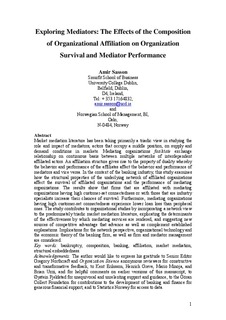Exploring Mediators: Effects of the Composition of Organizational Affiliation on Organization Survival and Mediator Performance
Journal article, Peer reviewed
Permanent lenke
http://hdl.handle.net/11250/93290Utgivelsesdato
2008Metadata
Vis full innførselSamlinger
- Scientific articles [2181]
Originalversjon
http://dx.doi.org/10.1287/orsc.1080.0363Sammendrag
Market mediation literature has been taking primarily a triadic view in studying the role and impact of mediators, actors that occupy a middle position, on supply and demand conditions in markets. Mediating organizations facilitate exchange relationships on a continuous basis between multiple networks of interdependent affiliated actors. An affiliation structure gives rise to the property of duality whereby the behavior and performance of the affiliates affect the behavior and performance of mediators and vice versa. In the context of the banking industry, this study examines how the structural properties of the underlying network of affiliated organizations affect the survival of affiliated organizations and the performance of mediating organizations. The results show that firms that are affiliated with mediating organizations having high customer-set connectedness or with those that are industry specialists increase their chances of survival. Furthermore, mediating organizations having high customer-set connectedness experience lower loan loss than those having lower customer-set connectedness. This study contributes to organizational studies by incorporating a network view to the predominately triadic market mediation literature, explicating the determinants of the effectiveness by which mediating services are rendered, and suggesting new sources of competitive advantage that advance as well as complement established explanations. Implications for the network perspective, organizational technology and the economic theory of the banking firm, as well as firm and mediator management are considered.
Beskrivelse
Originally published in Organization Science: http://orgsci.journal.informs.org/
